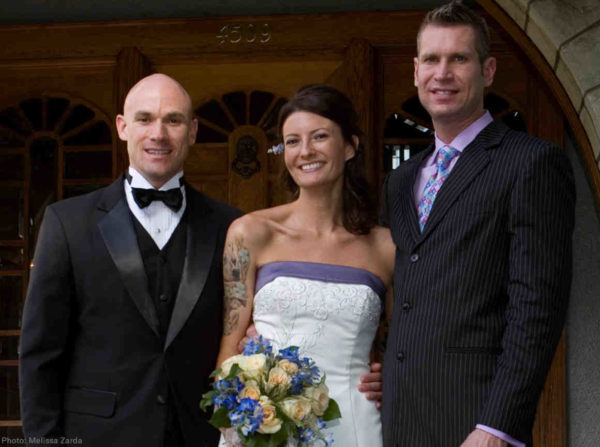National
Williams Institute panel dissects ‘ministerial’ and other problems with landmark Bostock jobs ruling
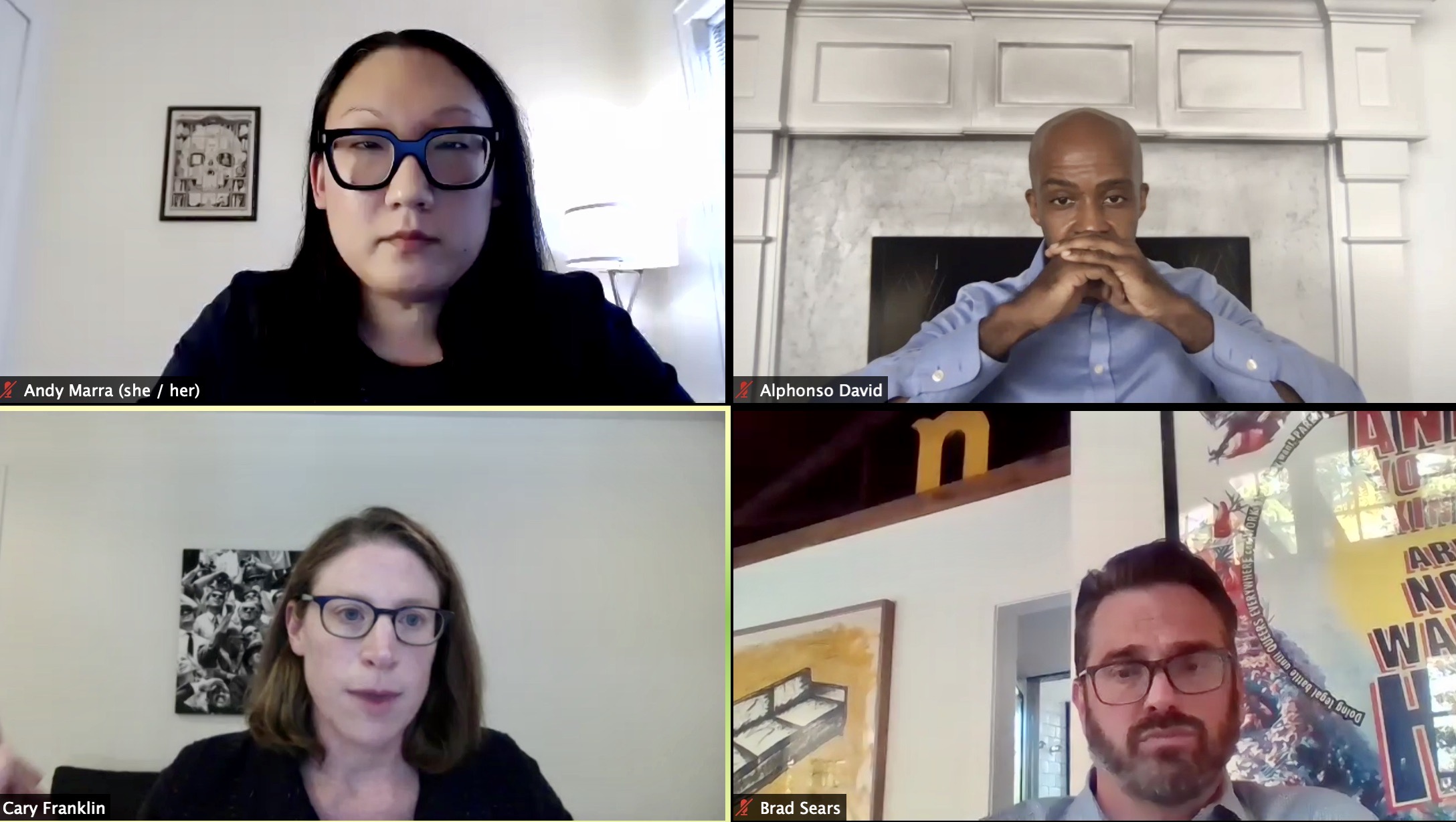
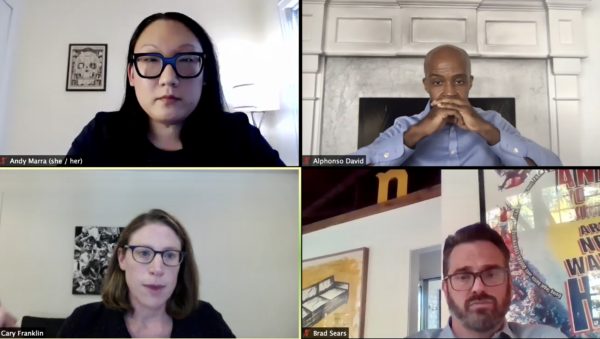
LGBTQ people are not a social or cultural issue. LGBTQ people are human beings linked by love and sexual attraction who confront issues of race, gender, age, legal and economic discrimination largely in intersectional silence due to explicit and internalized systemic homophobia and transphobia. The Williams Institute, an LGBTQ legal and policy think tank, counters that silence through scholarship, collecting and analyzing data that presents the persistent need for LGBTQ rights.
The data illuminates the LGBTQ community: As of April 2020, there are an estimated 13,042,000 million LGBT people age 13 and older in America. As of May, 1.7 million live in California, 15% of all LGBT adults in the U.S., Legal Director Christy Mallory told the Los Angeles Blade.
Williams Institute founding director Brad Sears noted during a July 31 webinar “Are We There Yet? LGBTQ Rights and the Bostock Decision,” that each number is an individual LGBTQ person struggling amid the cacophony of the COVID crisis and the uncertain economic future. That struggle could possibly be compounded by failure to enforce the June 15 landmark Supreme Court ruling in Bostock v. Clayton County affirming that Title VII protects employees nationwide from discrimination based on their sexual orientation and gender identity.
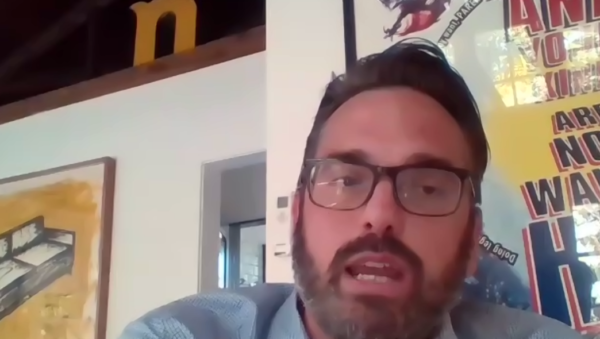
“We know that there are over 8 million LGBTQ people in our workforce and that half of them live in States that don’t have state laws protecting them from discrimination,” Sears said. And with the Equality Act stuck in Congress, there is no federal statute that explicitly provides that protection, either.
“We know that that has consequences,” Sears said, noting numerous Williams Institute studies reporting much higher rates of LGBTQ unemployment, poverty, food insecurity and housing instability. “In this time of economic downturn, we can see really what that looks like,” along with the greater LGBTQ vulnerability to COVID-19.
And while “it’s good to quantify the impact of that discrimination,” Sears said, “we also need to recognize that every one of those numbers represents thousands and thousands of individual people.”
As background to the webinar, the Williams Institute released a pre-COVID paper looking at state nondiscrimination laws. A key finding: “3.6 million more LGBT people will gain non-discrimination protections if state-level sex non-discrimination laws in their states are interpreted consistent with Bostock,” said Mallory. HRC published an analysis, as well: “What the Supreme Court Ruling in Bostock Means For State Legislative Efforts.”
Along with Sears, who is also Associate Dean of Public Interest Law at UCLA Law, the webinar featured Alphonso David, President of the Human Rights Campaign, Andy Marra, executive director of the Transgender Legal Defense & Education Fund (TLDEF), and Melissa Zahra, whose brother was a one of the plaintiffs in the Bostock case.
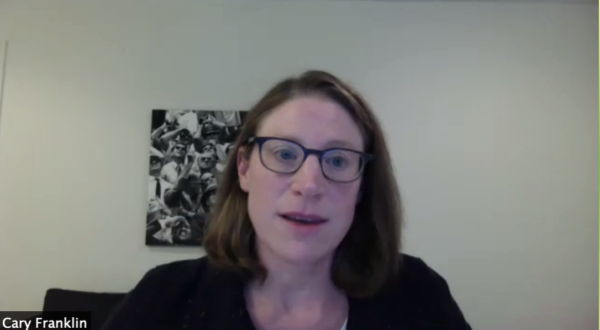
Professor Cary Franklin of the University of Texas laid out the case. She explained how Justice Gorsuch, who wrote the positive 6-3 decision, interpreted Title VII using textualism which looks at the text of a law, not what the original legislators intended. Therefore, the courts have held that “any time you discriminate against people because they are gay, lesbian or transgender, you are in part discriminating against them on the basis of their sex.” (Bisexual and non-binary people were not discussed.)
Dissenter Justice Alito was “apoplectic” about that interpretation, saying legislators in 1960 did not intend these sorts of protections. But, Franklin noted, the legislators didn’t then consider discrimination on the basis of motherhood or sexual harassment as forms of behavior that were discrimination on the basis of sex. “Now the court agrees that those things are sex discrimination.”
Unfortunately, Franklin said, the Court didn’t end there, mentioning three possible exceptions to avoid infringements on the rights of religious people: the exemption in Title VII itself for religious organizations to prefer “co-religionists” and discriminate against those who don’t conduct themselves according to the tenants of the religion; the “ministerial exception;” and expanded interpretation of the 1993 Religious Freedom Restoration Act (RIFRA).
“The ministerial exception is not part of Title VII. It is a court created doctrine,” Franklin said. “The court has interpreted the First Amendment to say that when religious organizations are hiring ministers, they don’t have to follow any anti-discrimination law. The Title VII exemption allows you to discriminate on the basis of religion. The ministerial exception allows you to discriminate at all the bases — race, national origin, sex, disability, and age, any anti-discrimination protections.”
Franklin put it into a larger context:
“It’s part of an enormous movement on the part of the religious right to blunt the effect of anti-discrimination law — courts have expanded the concept of ‘minister.’ Expanded it quite far. When I say ‘minister,’ you’re thinking of minister, priest, rabbi, Imam. That’s not what it means in the law anymore. It increasingly means workers for religiously-affiliated organizations.
As you may know, a decision came down this summer involving two fifth grade teachers at a Catholic school. Those teachers filed age and disability discrimination suits. And the court said their employer was not required to follow anti-discrimination law because those teachers were ministers.
Now this is an expansion of the law because those teachers didn’t have any particular religious training. They weren’t referred to by the title of ‘minister.’ They spent almost all of their day teaching math and English and science — but the Court held them to be ministers. So Justice Sonia Sotomayor in dissent says this is extremely worrisome. Coaches, camp counselors, social service workers, in house lawyers, media relations personnel, many folks who work for religious organizations could now be counted as ministers.
And I will tell you my concern and the kind of maximalist reading of the ministerial exception would extend to healthcare. You could imagine, and this is certainly the movement arguing that religiously affiliated hospitals, the folks who work for them, nurses, maybe even doctors are ministering to the sick.
This is a campaign to define an enormous swath of the American workforce as ministers and strip them of any anti-discrimination protection, certainly to protections annunciated in Bostock. But any protection of Title VII.”
The third exemption the Court mentions is RIFRA, originally enacted by the left “as a shield to protect the religious freedom of minority groups who were being injured by laws of general applicability.” But now it is being used as a sword to grant religious individuals license to discriminate against others by exempting them from the entire anti-discrimination regime, says Franklin.
“If the court continues to interpret RIFRA to excuse religious organizations from the mandates of anti-discrimination law, this will truly be the monster that eats anti-discrimination law,” says Franklin. “We will not have much of it left.”
Punctuating Sear’s point that real people are hurt by discrimination, Melissa Zahra told the story of her late brother, Donald Zarda who sued Altitude Express, alleging his employment was terminated because of his sexual orientation.
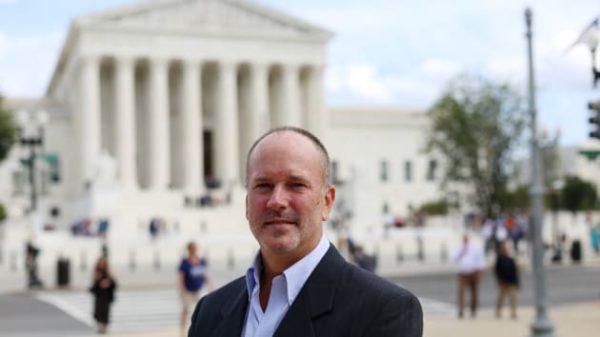
Gerald Bostock (Photo courtesy CNBC)
Zarda’s lawsuit had been consolidated with a lawsuit brought by Gerald Bostock who alleged he was fired from his child welfare job for being gay by officials in Clayton County, Georgia, and a lawsuit brought by Aimee Stephens, an employee at R.G. & G.R. Harris Funeral Homes, Inc., who alleged she was fired for being transgender.
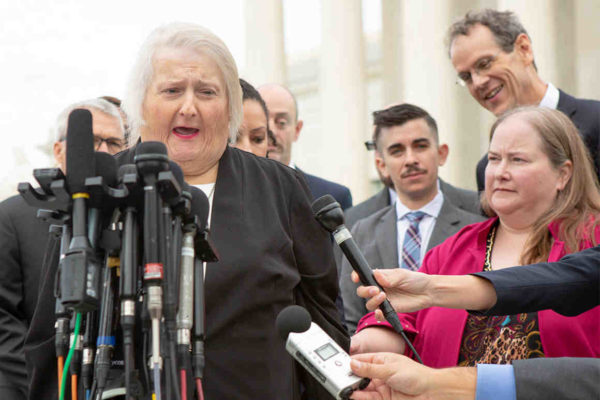
Aimee Stephens (Photo courtesy ACLU)
Melissa Zahra wanted to put a face behind the story to her brother’s lawsuit.
“Every single thing that mattered to my brother for the majority of his life was being in the air. This was something that he discovered when he was in the military and from the moment of his very first jump, it was his mission to be in the air.
He got every single certification that a skydiving instructor could get. He accumulated easily over 10,000 jumps. He got his pilot’s license. He completed his degree in aviation management, He even liked zip-lining — just any way to be in the air.
Once he had discovered skydiving, he had my family’s full support because we loved seeing how happy he was. It became his entire world and all of the time what he would be traveling around to all these different drop zones and airports and different countries and teaching and being an instructor. And whenever he came home, he would have a new batch of videos for us to all watch. And of course we found it frightening, but also cool. And, you know, he was just so happy. It was his passion and he loved sharing it with people. So when he decided to dedicate his career to it — he was actually in school for engineering and he decided this is what he wanted to do and it’s what made him happy.
It was about this time in 2010 where he’d already been a skydive instructor for a long time and he had a lot of experience. He was working at a drop zone in New York and he was doing tandem jumps where you’re strapped to the other person with close physical contact.
There’s a lot of joking by the instructors and people on the job because people are understandably nervous, especially first-timers. They try to break the ice and lightened things up a little bit. And in an effort to make a student more comfortable with their close physical contact, my brother mentioned he was gay — kind of like, ‘don’t worry about me. I’m gay.’
After that jump, he was fired from his job that he loved so, so much. He was just absolutely devastated by this.
It’s important to note that this wasn’t just a skydiving instructor job, like a summer job for him. It was his entire passion. He was afraid that it would be harder to get employment at other skydiving places because it’s a small community and people share and he didn’t want to be seen as difficult or whatever — but at the same time, he knew that he needed to stand up and that it wasn’t fair and that it wasn’t right. So he ended up bringing this suit against his former employer and it just went on for what felt like forever. He would be calling my sister and my mom and me for counsel and support. He was just heartbroken.
And he started at this point taking a little bit more risks because he felt like, ‘I’m not going to be able to work. My life’s changed because of this.’ And he started taking riskier jobs. He started getting involved with base jumping, wing suit flying, and the combination of all of that. And it was that that ultimately led to his passing in 2014 in an accident.
Don Zarda, Melissa Zahra, and Bill Moore (Photo courtesy ACLU)
At that point myself and his partner Bill Moore were left as executors of his estate and we decided we definitely needed to pursue this in Don’s memory because it was so important to him and he wanted nothing more than to clear his name.
So that’s what we did. And we had a wonderful team of people who helped us along the way. And I can’t even imagine having been able to do this without them. Every single person was so amazing. And the ruling came out and we were beside ourselves — and that’s where we are today.”
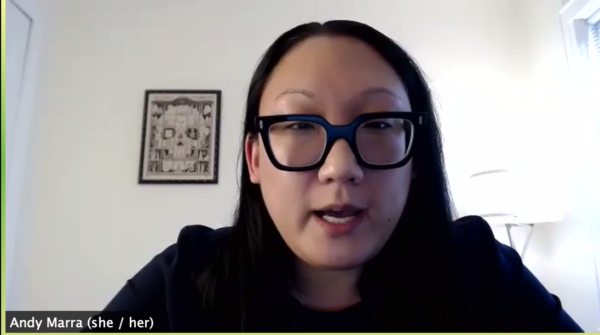
TLDEF‘s Andy Marra talked about the importance of trans employee Aimee Stephens bringing her case – the first-ever trans rights case to be heard by SCOTUS. She was represented by the ACLU, with trans attorneys, Gabriel Arkles, and Chase Strangio who appeared before a conservative-leaning Court and transgender leaders across the country signed numerous amicus briefs “to make sure that our voices were well-represented.” Unfortunately, like Don Zarda, Stephens did not live to see her Supreme Court victory.
“LGBTQ+ people won because of Title VII of the Civil Rights Act of 1964,” Marra said, “and LGBTQ+ people across the country owe a debt of gratitude to Black and Brown people who came before us and fought so hard for civil rights protections.”
Marra focused on Justice Samuel Alito’s sharp dissent and some of the challenges that trans people face, doing so as an “optimistic person” who believes “our movement will win” — and through a movement and activist lens.
Marra’s first concern was how Alito compared the litigants to pirates. What was most disturbing about Alito’s dissent is that it “relied on harmful and already debunked myths about our community,” Marra said. “LGBTQ people were essentially compared to being rapists and sexual predators. And we were also being cast as folks that had suffered from severe mental illness.”
Marra also noted the “hopeful aspect” for the movement of Alito’s dissent: “essentially Justice Alito laid out a roadmap for advancing legal equality for transgender people and some of that work is already underway,” such as in healthcare access and protections, sex- segregated facilities in sports, and transgender people being recognized with proper pronouns.
There are a number of active litigation being brought that relies on Title VII, including healthcare. One of TLDEF’s lawsuits was cited by Alito “and we’re absolutely proud to be a part of the parade of horribles, as I’m sure we could be described as,” Marra said.
“Because of this ruling, we have a strong case to argue future litigation,” Marra said. This is a window of opportunity for us, in terms of pronouns and the First Amendment. There was a separate section in the Alito dissent that covered freedom of speech and raising the concerns around, essentially, people being forced to use gender pronouns against their will.”
Though military issues are not part of TLDEF‘s litigation portfolio, Marra did note that there are more than 14,000 trans service members, though courts have held that Title VII does not pertain to them.
“It’s worrying,” Marra said, “that the military is the nation’s largest employer for trans folks and I think that will be very interesting to see how that particular issue moves forward.”
Finally, Marra pointed out the importance on educating attorneys and law students, especially those engaged in public interest law or pro bono work, about how Bostock pertains to trans people, especially people of color.
“There is a belief that this recent ruling and Title VII really doesn’t impact their day to day lives,” Marra said. “I think it reflects the fundamental struggles for transgender people to even attain an appointment or even have access to economic opportunity, let alone be fired from a job.”
Sears introduced HRC’s Alphonso David with accolades. “I’m just blown away by what you’ve been able to accomplish there already,” he said.
David noted that the Williams Institute has been “so instrumental to the movement over the past several decades. I know I’ve been doing this work for more than 20 years, and I’ve been relying on the research from the Williams Institute.”
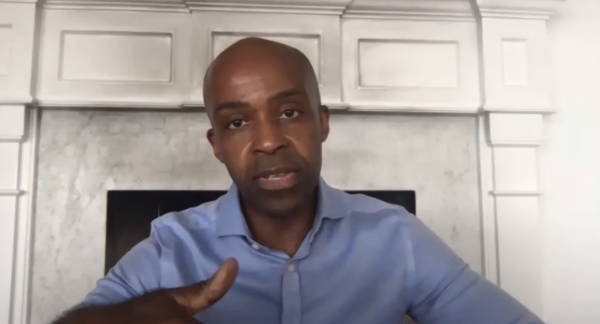
The Bostock decision, David said, “yes, it is a significant decision. But it has significant limitations, as well.”
The ruling reminded him of the 1998 Oncale v. Sundowner Offshore Services, Inc.lawsuit brought by a male oil rig worker who alleged repeated subjected to sexual harassment by male coworkers. Justice Anton Scalia wrote the majority opinion saying workplace discrimination includes sexual harassment by male coworkers.
“It was a great ruling, but we were also concerned about the application” said David. “And we were concerned about the holding in Oncale being limited or limiting same sex harassment to three situations that were enumerated in the holding. We also were concerned about the difficulties of proving an aggressor’s sexual desire or orientation because of the inference that is not really presumed and how our plaintiff’s going to have to prove that someone was actually harassing them when the person sexual orientation may not be presumed in those cases.”
David noted that there have been many decisions over the years that are inconsistent about the application Oncale. He felt the same about Bostock.
“Here we have a significant ruling that says that LGBTQ people should be treated the same as everyone else under Title VII, because of sex includes sexual orientation and gender identity, which is great.
But we know about the limitations: the Court said it doesn’t relate to religious objections — they’re not talking about that issue. They’re certainly not talking about sex-segregated spaces so we’re talking about bathrooms. We’re also talking about sports. Those issues, the Court did not address it all in Bostok, and I’m not suggesting that we would lose those cases if they were to be advanced to the Supreme court — but it does open up the possibility that we will be confronted with those cases in the near future, where opponents of equality will use Bostock against us. So I’m concerned about that.”
David also raised the point of the implications of Bostock on people of color since often discussion about the LGBTQ community historically do not include people of color.
“That has to change,” David said, as well as considering how Bostock does not apply to public accommodations.
“We have places of public accommodations that are not included in the 1964 Civil Rights Act,” he said. “So restaurants and hotels are certainly included. But there are other places — retail stores, salons, transportation hubs — are not included and that is of significant concern for me.”
David noted that “people of color continue to face persistent discrimination on a daily basis in stores and salons in accessing transportation services, like car services and taxis.”
He cited the example of clerks in a Georgetown neighborhood in Washington, DC, using a mobile app that allowed them to profile suspected shoplifters.
“When they reviewed the data, 90% of the photographs that they took were of Black people, often accompanied by racist language,” David said. Additionally, in Wisconsin, “a Black professional basketball player was denied access to a jewelry store based on his race. This is happening all over the country” where states or locales do not have non-discrimination laws.
“There are no federal laws that protect correct us when I get into an Uber or Lyft as a Black man or as a gay man. There are no federal laws that protect me in the instance of a retail establishment if I want to go in and purchase a suit or a tee shirt. I can face discrimination unless I have recourse under state law,” David said. “So Bostock is incredibly important for us, is a huge landmark achievement. But we cannot lose sight of how much work we have to do.”
Here are additional resources:
Cary Franklin’s 2012 Harvard Law Review article, which the Supreme Court cited in Bostock:
Human Rights Campaign’s recent legal actions:
- What the Supreme Court Ruling in Bostock Means For State Legislative Efforts
- Human Rights Campaign: Supreme Court is On Right Side of History for LGBTQ Rights
- HRC Files Federal Lawsuit Against Trump-Pence Administration
TLDEF’s recent initiatives:
-
Boston v. HHS filed on July 9th by TLDEF and other civil rights groups to challenge new rules released as it pertains to Section 1557 of the ACA https://tldef.org/stay-informed/breaking-were-suing-administration/
-
TLDEF’s Trans Health Project takes a comprehensive, systematic approach to expanding access to transgender-related health care by educating affected individuals about their legal rights; cultivating a robust movement to achieve health care equity; expanding enforcement of existing legal protections; and driving clinical policy changes among insurance carriers.
Here’s the full panel discussion, as well as questions and answers at the end:
National
Trans rights activist Miss Major Griffin-Gracy dies at 78
Revisiting Blade’s 2024 interview with legendary voice for equality

Miss Major Griffin-Gracy, a nationally acclaimed organizer and activist for transgender people, the LGBTQ community, sex workers, and incarcerated people, died Oct. 13 at her home in Little Rock, Ark.
Her passing was announced by the Little Rock-based Griffin-Gracy Educational Retreat and Historical Center, also known as House of gg, a transgender support and services center she founded in 2019.
“Miss Major – known as ‘Mama’ to many – was a Black, trans activist who fought for more than 50 years for trans, gender nonconforming, and the LGB community, especially for Black trans women, trans women of color and those who have survived incarceration and police brutality,” the statement announcing her passing says.
“Major’s fierce commitment and intersectional approach to justice brought her to care directly for people with HIV/AIDS in New York in the early 1980s and later to drive San Francisco’s first mobile needle exchange,” the statement says.
It adds, “House of gg was born out of her dream to build a center that would empower, heal and be a safe haven for Black trans people and movement leaders in the Southern U.S. – a space for our community to take a break, swim, enjoy good food, laugh, listen to music, watch movies, and recharge for the ongoing fight for our lives.”
A Wikipedia write up on Griffin-Gracy says she was born and raised in Chicago and came out as trans in the late 1950s. It says her parents were not accepting of her gender identity, prompting her to leave home at a young age and work for a while as a showgirl at the Jewel Box Revue theater in Chicago before moving to New York.
In a 2014 interview with the Bay Area Reporter, she said that after moving to New York in the 1960s she became a regular patron of the Stonewall Inn gay bar, at which trans women were known to gather. She said she was there at the time of the 1969 police raid that triggered the Stonewall rebellion when patrons fought police in the historic action credited with starting the modern-day LGBTQ rights movement.
Griffin-Gracy began work in community services, including services for trans women, after moving to San Diego in 1978, according to the Wikipedia write-up, and later performed home health care work during the early years of the AIDS epidemic in the 1980s.
It says she moved to San Francisco in the 1990s and worked with multiple HIV/AIDS organizations, including the Tenderloin AIDS Resource Center. In 2004, she began work at the San Francisco-based Transgender Gender Variant Intersex Justice Project (TGIJP) and later became executive director of the organization. The organization provides support services for trans, gender variant, and intersex people in prisons.
Shortly before traveling to Chicago in 2024 to attend the Democratic National Convention as an honored guest of the National LGBTQ+ Task Force Action Fund, Griffin-Gracy participated in an interview with the Washington Blade via Zoom from her home In Little Rock. Among other things, she told of her support for Democratic presidential candidate Kamala Harris against Donald Trump in the 2024 presidential election.
“I plan on going to every place Trump goes and speak to the tender loving people in those places and tell them what a liar he is and how insane he is and that they just shouldn’t vote for him,” she told the Blade.
Among those praising Griffin-Gracy’s work and lamenting her passing was David Johns, CEO and executive director of the D.C.-based LGBTQ advocacy group National Black Justice Collective.
“Her pioneering work to center and uplift Black trans women, particularly those who have been incarcerated and faced police brutality, made space for the most powerful and most marginalized members of our community and set the foundation for the freedom work so many of us continue today,” Johns said in a statement.
“At a time when the rights and dignity of trans people are again under relentless attack, Miss Major’s life reminds us of what it means to persevere in the fight for equality that all LGBTQ+/same gender loving (SGL) people can live freely an authentically,” Johns said in his statement.” Her spirit will continue to guide us as we fight for a world where every Black trans person can thrive and live a joy-filled life.”
An excerpt from the Blade’s August 2024 interview and profile of Griffin-Gracy follows:
Those who are familiar with Miss Major’s brand of activism might be surprised by her work with the Task Force Action Fund, her appearance at the DNC, and perhaps especially her commitment to criss-crossing the country to talk voters out of supporting Donald Trump and into supporting Vice President Kamala Harris’s historic bid for the White House.
As shown in “Major!” the 2015 documentary about her life, and a 2023 memoir comprised of interviews with journalist Toshio Meronek called “Miss Major Speaks: Conversations with a Black Trans Revolutionary,” the activist’s foremost concerns have always been centered around providing for her trans brothers and sisters.
Her work on this front is never ending: [Griffin-Gracy’s assistant Muriel] Tarver gave the Blade a virtual tour of Miss Major’s property, which she has used as a refuge for trans folks who are free to stay and relax on the well-kept grounds, which are complete with a guest house and a pool.
Where she may have sidestepped electoral politics in the past, however, there is “so much happening to whereby you had to get involved in it now,” Miss Major said. “But before it was just — my community has suffered so bad for so long, so often, that you’ve got to do something to help them navigate the bullshit that goes on in the world.”
This usually means ensuring that basic needs are met. “And I don’t feel as if politics helps that,” she said, because “it’s got to be people and the relationships you build and what you build together with another person that makes it better.”
Miss Major added, “I want things to be better for all of us. You know, transgender and non transgender people.” And as society has begun to make space for those with non-cisgender identities, the backlash has been vicious. “They’re so afraid of opening up to us,” she said.
When it comes to political candidates, she said, “As an ordinary person, you know, I’m concerned about food and gas and clothing and shit like that. And, you know, who else cares about this? I need to know the person who’s in charge cares and is going to do something to alleviate the stress on me to get it.”
By the time President Joe Biden announced his decision to step aside on July 21 — well before that pivotal moment, Tarver stressed — Miss Major and the Task Force Action Fund were ready to spring into action.
“It was quite a service act that he did for the country,” Miss Major said. “Because I really believe that he could have gone further, but he just didn’t have what it took. And so when he stepped out and made her the nominee, he invigorated, and he poured such joy to this country, and hope, and belief that it can be done, that [Trump] can be stopped.”
“As we all heard about the potential for Biden stepping down and putting aside his personal and political interests for the sake of democracy, which is a pretty historical and brave thing, we all wanted to be ready to respond to what would happen,” Task Force Action Fund Communications Director Cathy Renna told the Blade by phone.
Issuing a joint endorsement of Harris was historic for both Miss Major and the Task Force Action Fund, Renna said. “We have not endorsed anyone since Jimmy Carter, which was shortly after our founding, right? So, we’re talking about almost 50 years ago.”
“We wanted a bold choice,” she said, “and we also understand what’s at stake in this election.”
Miss Major sees the contrast between the two candidates as clear and compelling; the difference between sanity and insanity, competence and chaos. “Do you want someone who lies to you? Or do you what someone who tells the truth?”
Trump spreads filth and disorder like the character from Charles M. Schulz’s “Peanuts” comic strip who is perpetually surrounded by a cloud of dust and detritus, she said.
Harris, on the other hand, represents the future. “She’s breaking the ceiling. There’s a glass ceiling. And when she breaks through, she’s gonna go on,” Miss Major said. “And after this, something like 10s of 1000s of people are gonna go through that, too. It’s just going to be phenomenal.”
(Christopher Kane contributed to this report.)
National
LGBTQ rights on the line: What to watch as Supreme Court’s new term begins
The Supreme Court will hear cases shaping transgender sports participation and conversion therapy, with major LGBTQ rights implications.

The Supreme Court’s new term begins this week, with multiple cases on the docket that could have serious consequences for the civil rights of the LGBTQ community.
Many issues are being debated this term, including the scope of civil rights protections under the Equal Protection Clause, Title IX, and the Voting Rights Act—all of which could leave LGBTQ Americans less protected.
This Supreme Court is different from years past. Its right-wing supermajority is utilizing a more activist approach to legal interpretation—siding more often with President Trump’s preferred interpretation of laws rather than a more constitutional evaluation. One Supreme Court Justice, Clarence Thomas, even went so far as to publicly state he has a problem with the way judges are restricted by past decisions, saying he is against the concept of stare decisis (or sticking to prior judges’ decisions) and that they are “not the gospel.”
There are three major cases that in some way impact—or have the possibility of impacting—the rights of LGBTQ Americans: West Virginia v. B.P.J., Little v. Hecox, and Chiles v. Salazar. The first two deal with the rights of transgender girls participating in sports. The last one, Chiles v. Salazar, centers around the legality of banning conversion therapy.
West Virginia v. B.P.J.
In West Virginia v. B.P.J., a transgender girl, known as B.P.J., takes gender-affirming medication and has since the onset of puberty. She wants to compete on her school’s cross-country and track teams. In 2021, West Virginia passed the “Save Women’s Sports Act,” which requires public school and collegiate sports teams to designate their players’ genders by “biological sex” rather than gender identity.
In this case, the Court will determine whether this act violates Title IX—a federal law prohibiting discrimination based on sex in education or any institution that receives federal funding—or the Equal Protection Clause, which prohibits unfair and unequal discrimination, by requiring B.P.J. to be on a team based on her biological sex.
As Joshua Block, senior counsel with the American Civil Liberties Union’s (ACLU) LGBT & HIV Project, explained, “In terms of the legal issues before the court, the West Virginia case presents both the Title IX issue and the equal protection issue.” He also highlighted the broader impact: “Some of the lower courts are actually holding their cases pending BPJ, the Seventh Circuit recently did that in one of their restroom cases.”
Little v. Hecox
In Little v. Hecox, the Court will similarly evaluate the legality of Idaho’s transgender sports law—the “Fairness in Women’s Sports Act,” which, since its passage in 2020, has barred any transgender girls from participating on public school-affiliated sports teams. There is specific wording in the law that says the hormones present in transgender women, regardless of their stage of transition, make them predisposed to winning and create an unfair playing field—even if transgender people take Gender-Affirming Hormone Therapy (GAHT).
Lindsay Hecox, a transgender woman and student at Boise State University, attempted to join the school’s cross-country team but was denied, with the school citing that her participation violates the law. Hecox, along with a cisgender high school athlete identified in court documents as Jane Doe, filed a suit arguing that the “Fairness in Women’s Sports Act” violated both of their constitutional rights under the Equal Protection Clause of the 14th Amendment.
Block noted during the briefing, “Lindsay, unlike BPJ, is a young woman in college, and she has not had blockers. She suppressed testosterone after puberty at the same time, as I mentioned, she was not, frankly, good enough to make the team, and has just been playing club sports.” Regarding procedural concerns, he added, “Unlike other cases where a party has sought to insulate a favorable judgment from review, we obviously think the decision below needs to be vacated because it’s moot.”
Block went on to spotlight that both West Virginia v. B.P.J. and Little v. Hecox are clearly supported by Title IX, using the Court’s decision in 2020 in Bostock v. Clayton County as the basis. In that case, the Court found that the Civil Rights Act of 1964 protects not only on the basis of sex and race, but also on sexual orientation and gender identity.
“There’s obviously an overlap on the question of whether, as a general matter, the Supreme Court’s reasoning in Bostock applies to Title IX,” Block said. “Bostock says you can’t fire someone for being transgender. I think it should go without saying that a school principal can’t expel someone for being transgender either. Despite that, the states are trying to argue that Bostock doesn’t apply to Title IX at all.”
Chiles v. Salazar
While West Virginia v. B.P.J. and Little v. Hecox examine Title IX and the Equal Protection Clause, Chiles v. Salazar evaluates the legality of a Colorado House Act banning conversion therapy under the Free Speech Clause of the First Amendment. The Free Speech Clause has five parts, but this case focuses on the right to practice the religion of one’s choosing and the provision that the state may not establish a religion. Conversion therapy is defined in this case as any practice that “changes behaviors or gender expressions or seeks to eliminate or reduce sexual or romantic attraction or feelings toward individuals of the same sex.”
In Chiles v. Salazar, Kaley Chiles, a licensed counselor who identifies as a Christian, has argued that HB19-1129, also known as the “Prohibit Conversion Therapy for a Minor Act,” violates her First Amendment rights. Chiles practices “faith-informed” counseling that seeks to “reduce or eliminate unwanted sexual attractions, change sexual behaviors, or grow in the experience of harmony with [their] physical body.” She brought forward a pre-enforcement lawsuit against the state, arguing that the law has made her refrain from discussing possible gender- and sexuality-related topics with her clients and has dampened her ability to provide counseling services in line with her and her clients’ religious preferences.
Josh Rovenger, the legal director at GLAD Law, an LGBTQ+ legal services and civil rights organization, explained what Chiles v. Salazar could mean for the future of LGBTQ rights in America.
“Fundamentally, what’s at stake… is whether a state like Colorado and the 23 other states, plus the District of Columbia that have similar laws have the ability to protect LGBTQ plus youth from disproven conversion therapy practices that cause lasting trauma to the individuals, their families, and entire communities.”
He went on, explaining that the scope of the law is so specific that the plaintiff’s concerns may not apply.
“The law here is really quite narrow, aimed at a very specific, specific prohibition, and a lot of the activities that the plaintiff says that she wants to engage in, as Colorado points out in its brief, just aren’t covered by the law,” Rovenger said. In addition, he added there are multiple states that have banned the practice of conversion therapy with little issue. “Multiple states which have bipartisan laws that were passed with widespread support, including support from religious communities, would potentially be invalidated as a result of that type of decision, and that would be overruling an overwhelming medical consensus about the evidence of conversion therapy practice harms.”
As GLAAD noted in a press release, “Every major medical and mental health association in the country condemns the practice and supports efforts to prevent practitioners from violating their oath to do no harm.”
The Bigger Picture
These cases, Rovenger explained, don’t collectively signal that the Supreme Court will side in one particular way, but rather that some of the justices are interested in the cases.
“The first is the fact that they took these cases only means that four justices were interested in hearing them,” Rovenger said. “It does not tell us anything about where they’re going to come out on the cases ultimately. And there was no reason for the court to take either of or any of these cases.”
Rovenger, who served as Associate Counsel to President Biden in the White House for Racial Justice & Equity, went on, emphasizing the importance of the broader political context in this legal targeting of trans kids.
“Before 2020, decisions about sports were being left to school districts and sports organizations, the people who know these issues best… And then in 2020 we saw trans issues more generally, but sports in particular, being used as a wedge issue and a weapon to further a political agenda,” he said. “Since the beginning of 2025 that has been on steroids from the federal administration, which has really targeted transgender individuals, generally, and transgender kids who just want the opportunity to play school sports for the same reason other kids do — to be part of a team where they feel like they belong.”
He continued, saying that these cases would mostly impact some of the most vulnerable LGBTQ population—LGBTQ youth.
“These cases are going to have significant implications for LGBTQ youth, for LGBTQ individuals more generally, for school environments, for the ability of states to protect LGBTQ youth from discredited medical practices. And so when we think about the day-to-day experience of LGBTQ folks in this country, particularly youth, these cases will have a direct impact on those lived experiences.”
A fourth case concerns marriage equality and a decade-old effort by former Kentucky county clerk Kim Davis to overturn the Obergefell ruling. Legal experts have called the effort a long shot. Justices will likely decide whether to hear the case later this fall.
National
Military families challenge Trump ban on trans healthcare
Three military families are suing over Trump’s directive cutting transgender healthcare from military coverage
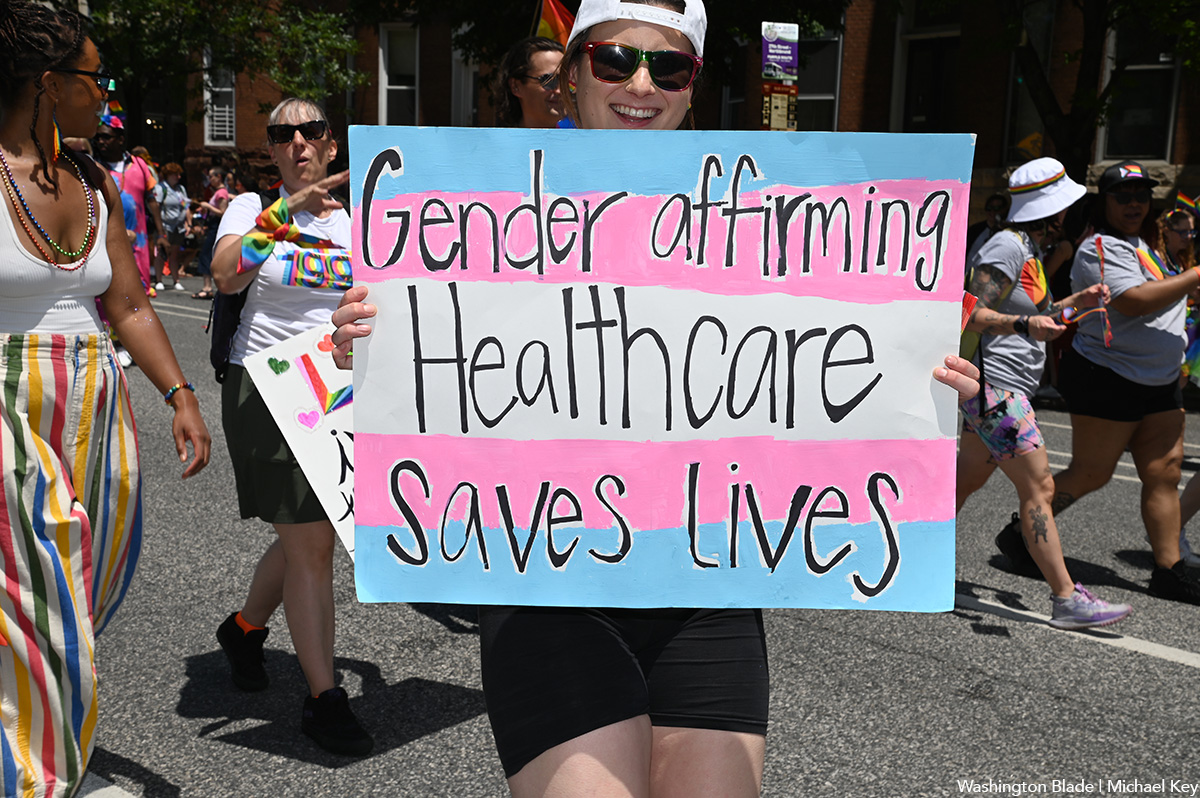
Three military families sued the Department of Defense on Monday after President Trump’s anti-transgender policies barred their transgender adolescent and adult children from accessing essential gender-affirming medical care.
The lawsuit, filed in the U.S. District Court for the District of Maryland, challenges the legality of the Trump administration’s decision to ban coverage of any transgender-related medical care under Department of Defense health insurance plans.
Under the new directive, military clinics and hospitals are prohibited from providing continuing care to transgender adolescent and adult children. It also prevents TRICARE, the military’s health insurance program, from covering the costs of gender-affirming care for both transgender youth and young adults, regardless of where that care is received.
A press release from the families’ attorney explained that the plaintiffs are proceeding under pseudonyms to protect their safety and privacy. They are represented by GLBTQ Legal Advocates & Defenders (GLAD Law), the National Center for Lesbian Rights (NCLR), Brown, Goldstein & Levy, LLP, and Keker, Van Nest & Peters LLP.
“This is a sweeping reversal of military health policy and a betrayal of military families who have sacrificed for our country,” said Sarah Austin, Staff Attorney at GLAD Law. “When a servicemember is deployed and focused on the mission they deserve to know their family is taken care of. This Administration has backtracked on that core promise and put servicemembers at risk of losing access to health care their children desperately need.”
“President Trump has illegally overstepped his authority by abruptly cutting off necessary medical care for military families,” said Shannon Minter, Legal Director at NCLR. “This lawless directive is part of a dangerous pattern of this administration ignoring legal requirements and abandoning our servicemembers.”
“President Trump’s Executive Order blocks military hospitals from giving transgender youth the care their doctors deem necessary and their parents have approved,” said Sharif Jacob, partner at Keker, Van Nest & Peters LLP. “Today we filed a lawsuit to put an end to his order, and the agency guidance implementing it.”
“This administration is unlawfully targeting military families by denying essential care to their transgender children,” said Liam Brown, an associate with Keker, Van Nest & Peters. “We will not stand by while those who serve are stripped of the ability to care for their families.”
National
Supreme Court sides with transgender boy in bathroom access fight
Plaintiff challenging SC law

On Wednesday, the U.S. Supreme Court ruled that a transgender boy may use the boy’s bathroom in a South Carolina public high school while pursuing a challenge to a state law that requires students to use the bathrooms corresponding to their sex assigned at birth.
The order, which was unsigned by any of the justices, did not provide reasons for the court’s decision, but made clear that it applied only to the one student in this case. The order specifically stated that it was “not a ruling on the merits of the legal issues presented in the litigation” and was instead “based on the standards applicable for obtaining emergency relief.”
It should be noted that Justices Clarence Thomas, Samuel A. Alito Jr., and Neil M. Gorsuch filed dissents to the order, though they did not provide any explanation for their opposition.
This is not the first time the highest court in the nation has addressed trans rights in the country.
In 2020, the Supreme Court ruled in Bostock v. Clayton County that federal law prohibits anti-trans discrimination in employment. Despite this significant victory for trans rights, in June the court upheld a Tennessee law banning gender-affirming medical care for trans minors in U.S. v. Skrmetti. That ruling, which suggested the court could be used to remove protections for trans people, has contributed to increased scrutiny and the reconsideration of previous rulings favorable to trans rights, placing broader LGBTQ protections at risk.
The recent order comes as the Supreme Court prepares to hear two cases involving trans athletes and their rights to participate in sports under Title IX, the federal civil rights law that prohibits discrimination based on sex in educational programs and activities that receive federal funding. Advocates for trans rights have expressed concern that these upcoming cases could further challenge the legal landscape surrounding gender identity in schools and other public institutions.
National
Trump to honor Charlie Kirk with Medal of Freedom
Anti-LGBTQ political activist assassinated in Utah on Wednesday

At a Sept. 11 remembrance ceremony at the Pentagon on Thursday, President Donald Trump announced that he will award right-wing political activist Charlie Kirk the Presidential Medal of Freedom.
Kirk was assassinated less than 24 hours earlier at Utah Valley University while speaking on conservative talking points to a crowd.
The 31-year-old conservative commentator is best known for founding Turning Point USA, a nonprofit that sought to build a robust conservative youth movement. He earned notoriety for his unwavering loyalty to Trump, his advocacy of expansive Second Amendment rights, and his opposition to LGBTQ rights. Conservatives and far-right supporters have quickly elevated Kirk to martyr status since his death.
“Before we begin, let me express the horror and grief so many Americans feel at the heinous assassination of Charlie Kirk,” Trump said. “Charlie was a giant of his generation, a champion of liberty, and an inspiration to millions and millions of people.”
As of now, there is no indication when the award ceremony will take place, although Trump said “I can only guarantee you one thing, that we will have a very big crowd.”
Many credit Kirk with helping Trump return to the White House in 2024 by mobilizing young voters — particularly young men — on behalf of the twice-impeached president.
Kirk’s stance against LGBTQ rights was a central part of his political brand.
A staunch opponent of Obergefell v. Hodges, the landmark Supreme Court ruling requiring states to recognize same-sex marriage, Kirk often used incendiary rhetoric, at times calling for the erosion of LGBTQ rights altogether.
As host of “The Charlie Kirk Show” on the Salem Radio Network, he frequently denounced transgender participation in sports, referring to trans people and their supporters as “sick.” He also suggested they should be “taken care of like how things in the 1950s and 60s” were — an allusion many critics interpreted as a reference to lobotomies, shock therapy, and forced institutionalization.
Kirk often framed his views through the lens of “Christian values.”
On his YouTube channel, he invoked biblical passages, at one point citing Leviticus 20:13 to claim that the Bible’s call for the stoning of gay men reflected “God’s perfect law.”
The Washington Blade contacted several LGBTQ advocacy organizations for comment on Trump’s decision to posthumously honor Kirk, a man widely criticized for his hostility toward the LGBTQ community. Many focused instead on condemning the violence that ended his life.
“Political violence is unacceptable and has no place in this country,” said Kelley Robinson, president of the Human Rights Campaign, in an emailed statement. “We cannot ever accept this epidemic of gun violence as normal. We cannot keep living like this.”
Kristen Browde, president of the Florida LGBTQ+ Democratic Caucus, which has 21 chapters across the state, making it one of the largest LGBTQ caucuses in the nation, echoed those sentiments while pointing to the consequences of Kirk’s rhetoric.
“Political violence, for any reason, is wrong. Gun violence, for any reason, is wrong. Spending your life, inciting violence, demonizing political opponents? Attacking those who are different? Every bit as wrong. And when violence follows such actions? One can’t be shocked. All you can do is recommit yourself to fight against it.”
According to videos — and witnesses at Utah Valley University, Kirk was shot seconds after beginning to answer a question about how many”transgender” people were responsible for “mass shootings,” where he answered “too many.”
As of Thursday evening, Kirk’s killer remained at large. The FBI has identified a person of interest in its investigation and is offering a $100,000 reward for information leading to an arrest.
Utah
Charlie Kirk shot to death at Utah university
Anti-LGBTQ figure asked about trans shooters moments earlier

Charlie Kirk, a right-wing political activist, outspoken anti-LGBTQ figure, and founder of Turning Point USA, a conservative nonprofit, was shot and killed at Utah Valley University in Orem, Utah on Wednesday.
The 31-year-old was visiting the university’s Turning Point USA chapter and speaking to a large outdoor audience when he was struck in the neck by a single bullet fired from about 200 yards away. NBC reported that no suspect is in custody, despite university police previously indicating otherwise. President Trump announced Kirk’s death on social media.
Just moments before the shooting, an audience member asked Kirk, “How many transgender Americans have been mass shooters over the last 10 years?”
“Too many,” Kirk replied—seconds before being shot. Videos of the graphic incident have since gone viral online.
Kirk had long opposed LGBTQ rights and publicly opposed same-sex marriage. He frequently cited his “Christian values” as the basis for his positions, often quoting Leviticus 20:13 (“men lying with men… abomination”) as “God’s perfect law” on sexual matters.
He was also a prominent national voice in efforts to ban transgender healthcare, saying, “Donald Trump needs to run on this issue.” Kirk further proclaimed, “Pride is a sin,” and dismissed “gay corporations that hate America.”
On his YouTube show, he declared there are “only two genders” and described “transgenderism and gender ‘fluidity’ … lies that hurt people and abuse kids.” He also warned that LGBTQ efforts would not stop at marriage equality but instead aimed to “corrupt your children,” according to Media Matters for America.
Utah Valley University, established in 1941 as Central Utah Vocational School, is the state’s largest public university, with more than 46,000 students. It is located about 40 miles south of Salt Lake City.
National
Concerns for future emerge at U.S. Conference on HIV/AIDS
‘I’m done being treated like shit in the country I grew up in’

More than 2,400 people, including public health experts, scientists, physicians, local government officials, and community activists, turned out for the 29th annual United States Conference on HIV/AIDS, which took place Sept. 4-7 at the Marriott Marquis Hotel in D.C.
Organized by the D.C.-based group NMAC, formerly known as the National Minority AIDS Council, the conference is considered the nation’s largest and most comprehensive gathering of experts involved in addressing the HIV/AIDS epidemic in the U.S.
NMAC spokesperson Pavni Guharoy said NMAC officials will be completing a final count of the conference participants based on registration numbers later this week, but she said the current estimated attendance was at least 2,500.
The conference included more than 100 workshop sessions that focused on a wide range of issues related to the status of the HIV/AIDS epidemic in the U.S., with a focus on the large and growing number of people living with HIV who are 50 years of age or older.
Information released at the conference shows that as of 2022, of the nearly 1.1 million people living with HIV in the U.S., approximately 54 percent were 50 years of age or older.
Many of the sessions addressed the needs, concerns and sometimes stigma faced by diverse communities of people living with HIV and those at risk for HIV, including African American, Latinx, and LGBTQ communities, both those who are aging as well as young adults.
The conference also included four plenary sessions in which all conference attendees listened to two-dozen prominent keynote speakers. Among them was former U.S. National Institutes of Health official Dr. Anthony Fauci, who pointed out that continuing advances in HIV research have led to effective medical intervention that changed AIDS from a once fatal illness to a condition in which people with HIV can live “a normal life span.”
Other keynote speakers included Earvin ‘Magic’ Johnson, the acclaimed basketball player who became an advocate for people with HIV after testing positive for HIV 33 years ago, and Dr. Rachel Levine, who made history by becoming the first out transgender person to be confirmed by the U.S. Senate in 2021as an appointee by then-President Joe Biden as a U.S. Assistant Secretary of Health.
Also speaking was Jeanne White-Ginder, the mother of Ryan White, who was diagnosed with AIDS in 1984 at the age of 13 from a blood transfusion. White-Ginder told conference attendees how Ryan faced discrimination when he was initially barred from going to his school in Indiana out of fear that he could transmit the virus to others at school.

In a moving presentation, she told how Ryan became one of the nation’s early advocates for people with HIV/AIDS up until the time of his death in 1990, one month before his high school graduation. She said then-U.S. Sen. Edward Kennedy (D-Mass.) invited her to come to Washington to help lobby for a bill Kennedy introduced and which Congress passed in her son’s honor called the Ryan White Comprehensive AIDS Resources Emergency (CARE) Act in August 1990.
“Now, today, thanks to your hard work and dedication, Ryan’s bill and your bill, too, provides treatment and support to more than half a million Americans in big cities, small towns and rural communities across the country,” she said. “It has dramatically reduced suffering. It has enabled people to live with HIV, to live long and healthy lives.”
But White-Ginder joined the many conference speakers, including Magic Johnson, in calling on attendees and the public to urge Congress to reject the dramatic cuts in funding for federal AIDS programs, including the Ryan White program, proposed by President Donald Trump and Republican congressional leaders for the Fiscal Year 2026 federal budget.
Among those calling on the AIDS community and allies to speak out against the proposed budget cuts were Paul Kawata, NMAC’s outgoing executive director and CEO, who is retiring Oct. 7, and Harold Phillips, the former director of the White House Office of National AIDS Policy during the Biden administration and current NMAC Deputy Director for Programs who was chosen to succeed Kawata as NMAC CEO.
NMAC officials, led by members of its board of directors, praised Kawata for his 36 years of service as NMAC’s leader and his dedication to the cause of service and support for people with HIV and AIDS.
Kawata reflected on his work at NMAC and his concerns over the current political climate in Washington in a sometimes-emotional farewell address at one of the conference’s plenary sessions on Sept. 5.
“I’ll be honest with you. After 36 years the thought of leaving all of you is much more difficult than I thought it was going to be,” he told the gathering. “You are my family. You are the people that I love,” he said.
“You taught me how to be a better version of me. And I am so extraordinarily grateful for everything that you have given me,” he continued. “And you will always be a part of my heart.”
Pointing to members of the NMAC staff, both current and former members in the audience, Kawata said, “NMAC is NMAC because of what you do every single day with your life. You fight to make a difference in the world. And I am honored and privileged to call you my friends.”
Without mentioning the Trump administration by name, Kawata had harsh words for what he said was happening now in the United States and its impact on people living with HIV.
“I’m not going to lie to you,” he said. “I’m done being treated like shit in the country that I grew up in. I’m done being told that I’m a second-class citizen because of who I love,” he continued. “It’s not my America anymore. And I’m worried for our future.”
He added, “We always talk about the pendulum of justice, about the arc of justice. And I really want you to know in this moment, as difficult and as awful and how hellacious it is, we are on the right side of history. We are the ones who will change the world.”

In his remarks at the conference’s closing Sept. 7 plenary session, Fauci said, “We’re in very difficult times. You don’t need me to tell you that. But we’ve got to continue to put the pressure on what we did in the ‘80s with the activist groups, to make sure we do end the epidemic.”
He noted that he was at his job as director of the U.S. National Institute of Allergies and Infectious Diseases in the early 1980s, when the AIDS epidemic first surfaced and the AIDS patients he and his colleagues cared for, had little chance of survival.
“Fast forward now, 44 years, extraordinary things have happened,” Fauci said. “We now have drugs that you are all very aware of that can have an individual living with HIV live essentially a normal life span in putting under the care and the availability of drugs,” he continued.
“We know what U equals U – something that we didn’t imagine some years ago. That undetectable equals untransmissible,” he said, referring to the current HIV medication that suppresses the HIV virus to an undetectable level that prevents an infected person from transmitting it to someone else.
“And right now, with these drugs that we have for the prevention of HIV we have what we actually hoped for years ago – and that is to end the HIV epidemic,” he said.
Dr. Rachel Levine, who during the Biden administration served in the dual role as Assistant Secretary of Health at the U.S. Department of Health and Human Services and as director of the U.S. Public Health Service Commissioned Corps, also spoke at the closing session of the conference.
She noted that she began her career as a pediatric physician in 1983 in New York City, at the time of the early stages of the AIDS epidemic. From that time through her years as Assistant Secretary of Health, Levine said she observed first-hand the skills and dedication of doctors, nurses, and others who cared for people with HIV/AIDS who she described as the HIV care workforce.

“The HIV care workforce since that time has been incredibly dedicated, with many people working for decades,” she said. “And working to end the HIV epidemic in the United States and around the world. We applaud you. You are in this room. We applaud you arduously for your dedication and for your passion.”
Levine also noted that the cuts in funding and large-scale federal worker layoffs brought about by the Trump administration have had a direct impact on the HIV care workforce.
“Many dedicated public health leaders, including most of the HIV and infectious disease team who I worked with in my office at HHS have had their positions eliminated,” she said. “These hard-working civil servants went to work every single day to support the health and wellbeing of all Americans, including those living with HIV.”
She added, “And we know that there are shortages in HIV care. And it is so critical at this challenging time that we support you, the HIV care workforce.”
Many conference attendees said Magic Johnson played a leading role in boosting morale and spirit at the 2025 U.S. Conference on HIV/AIDS by his inspirational speech at the Sept. 5 plenary session.
Upon receiving a prolonged, standing ovation after being introduced as the next speaker, Johnson said, “When I think about 33 years living with HIV in a moment that changed my life forever. And what a blessing to be here 33 years later to tell that story at a time when there was only one drug.”
Johnson added, “Wow, and they said it probably is a death sentence for myself, and I had to wrap my arms around making the toughest decision I probably had to make in my life, which was to retire from the NBA.”
Among other things, Johnson said his doctors told him that while he was physically capable of continuing to play basketball, the stress of an 80-game season could impact his immune system and lower his T-cell count.

With the support of family, friends, and his community, Johnson said he miraculously survived the early days without a known fully effective HIV drug. And at the request of community activists, he agreed to speak out as a well-known figure and a person with HIV to inform “my community,” especially people of color, he said, about how to live with HIV and how uninfected people can lower their risk.
“But what I do, I adhere to my doctor. I take my meds. I work out, and then I love life and myself,” he said.
In response to the challenge facing people with HIV under the current political situation, Johnson said, “We got to pull ourselves together and continue this fight, because it’s important and we got to keep this at the forefront. Now, HIV and AIDS kind of slipped back. We got to bring it back up.”
Among other things, he said the nonprofit foundation he helped to form has “given away over $15 million” in grants to HIV/AIDS organizations. “And we will continue to do that because of the work you are doing.”
He received another thunderous applause and standing ovation upon the completion of his speech.
Phillips, who will succeed Kawata as NMAC’s CEO on Oct. 7, told the Washington Blade he believes this year’s U.S. Conference on HIV/AIDS was “extraordinary” under difficult circumstances.

“I think so, because this year we did this without a lot of federal support,” he said. “And many of the attendees – the federal government, HRSA, the Ryan White program told them they couldn’t use their grant funds to attend the conference, which was a shame.”
Phillips added, “But I think with a crowd of over 2,400, some people found a way to be here regardless and thought that it was important, and the topic was important enough. And I think our listening sessions, our workshops, our plenaries hopefully gave them what they needed to continue to be activated to serve people living with HIV. “
“And also gave them a sense of hope, especially in these dark times that we can continue to work to end the HIV epidemic,” he said.
National
House GOP seeks to cut all U.S. HIV prevention programs in 2026
‘A disastrous bill that will reignite HIV in the United States’

The Republican-controlled Appropriations Committee of the U.S. House of Representatives has released its Fiscal Year 2026 funding bill that calls for cutting funds for domestic HIV prevention, treatment, and care programs by at least $1.7 billion, which is an amount significantly greater than the AIDS budget cuts proposed by President Donald Trump.
Among other things, the bill, if passed by the full Congress, would eliminate federal funding for all HIV prevention programs in the U.S. as well as eliminate the Ending the HIV Epidemic Initiative program that Trump persuaded Congress to pass during his first term as president.
“This is not a bill for making America healthy again, but a disastrous bill that will reignite HIV in the United States,” said Carl Schmidt, executive director of the D.C. based HIV + Hepatitis Policy Institute, in a Sept. 1 statement.
“We urge Congress to reject these reckless cuts,” Schmidt says in the statement. “Eliminating all HIV prevention means the end of state and local testing and surveillance programs, educational programs, and linkage to lifesaving care and treatment, along with PrEP,” the statement continues. “It will translate into an increased number of new HIV infections, which will be costlier to treat in the long run.”
It adds, “At a time when we have the tools to prevent HIV, including new long-acting forms of PrEP, we must not abandon the bipartisan progress our nation has made in combating HIV.”
The proposed bill by the House Appropriations Committee, which has not yet taken a full committee vote on the bill, would also cut the Ryan White HIV/AIDS Care and Treatment Program by $525 million or 20 percent.
The bill would eliminate the entire $1 billion in prevention funding at the U.S. Centers for Disease Control and Prevention, including $220 million allocated to President Trump’s Ending the HIV Epidemic (EHE) initiative.
Schmidt points out that nearly 90 percent of this funding “flows to state and local health departments, including those in the South that do not have dedicated state funding and carry over half of HIV cases in the country.”
The House committee proposal supports the president’s budget proposal to eliminate $43 million in dedicated funding for hepatitis prevention at the CDC and instead proposes a $353 million block grant to states that would also include STD and tuberculosis prevention. This is $53 million more than the president proposed but still represents a combined cut of $24 million, Schmidt says in his statement.
“Instead of decreasing and diluting funding for hepatitis, if the country is serious about addressing chronic health conditions,” added Schmid, “we should be increasing funding so that people with hepatitis can be identified through testing and linked to treatment, and in the case of hepatitis C, a cure.”
The proposal by the House Appropriations Committees follows the U.S. Senate’s release earlier this year of a bipartisan FY 2026 budget bill that would maintain current funding for domestic HIV programs. If the House committee passes its proposed budget bill the budget provisions would have to be reconciled with the Senate version, and a reconciled version must then be passed by the full Congress.
National
Doctor who led mpox response resigns from CDC, slams administration
‘Unskilled manipulation of data to achieve a political end’

Dr. Demetre Daskalakis, director of the National Center for Immunization and Respiratory Diseases at the Centers of Disease Control and Prevention, resigned from his position on Wednesday in a scathing social media post.
“I am unable to serve in an environment that treats CDC as a tool to generate policies and materials that do not reflect scientific reality and are designed to hurt rather than to improve the public’s health.” Daskalakis wrote in a resignation letter he posted to X. “Having worked in local and national public health for years, I have never experienced such radical non-transparency, nor have I seen such unskilled manipulation of data to achieve a political end rather than the good of the American people.”
Daskalakis, who’s gay, was among three senior officials to resign following President Trump’s firing of CDC Director Susan Monarez. She is fighting her dismissal.
In 2022, Daskalakis drew praise from the LGBTQ community while serving as White House National Monkeypox Response Deputy Coordinator. Daskalakis previously served as medical director for the New York-headquartered Mount Sinai Health System and then was made deputy commissioner for the Division of Disease Control at the New York City Department of Health and Mental Hygiene. In late 2020, as the U.S. saw thousands of new covid fatalities each day, Daskalakis joined the Centers for Disease Control and Prevention’s Division of HIV/AIDS Prevention.
In an exclusive interview with the Blade during the mpox crisis in 2022, he warned of the dangers of homophobic stigma.
“Stigma is stigma, and homophobia is homophobia,” Daskalakis said, and while these problems are older, more intractable, and broader in scope than public health messaging around MPV, it is important to not “attach an infection to an identity.”
“Stigmatizing a disease and creating stigma really creates rabbit holes that take people away from [figuring out] how to respond to an infectious disease — and the way that you respond to infectious diseases, the focus on community, the focus on knowledge, and the focus on data, which should act as a guidance” in getting messages to people, whether through online social platforms or other channels, he said.
Dr. Monarez, who only served in her job for one month, said she refused “to rubber-stamp unscientific, reckless directives” and accused HHS Secretary Robert F. Kennedy Jr. of “weaponizing public health.”
Dr. Monarez reportedly clashed with Kennedy over vaccines. The government announced earlier this week that healthy adults would not be eligible for a new COVID booster and instead only those 65 and older, children, and those with underlying medical conditions would be eligible for the new vaccine.
National
CVS Health withholds coverage for new HIV prevention drug
AIDS activists criticize delay for acclaimed twice-yearly PrEP medication

CVS Health, one of the nation’s largest pharmacy benefit manager companies that play a lead role in deciding which drugs are covered by health insurance plans, has initially decided not to approve coverage for the new HIV prevention drug Yeztugo
Developed and manufactured by the pharmaceutical company Gilead Sciences, Yeztugo was approved for use in June of this year by the U.S. Food and Drug Administration as an HIV prevention or PrEP medication that needs to be taken just twice a year by injection.
HIV prevention advocates hailed the new drug as a major breakthrough in the years long effort to curtail and end the HIV/AIDS epidemic by enabling far more people at risk for HIV infection to adhere to a prevention drug regimen that needed to be taken once every six months rather than daily pills or through bi-monthly injections.
But the same advocates warned that the benefits of Yeztugo, which tests showed is greater than 99 percent effective in preventing HIV infection, could not be realized if the cost of the drug is not covered by health insurance plans or other coverage programs.
At the time the FDA approved its drug, Gilead Sciences announced that the yearly retail price for Yeztugo without insurance coverage would be $26,218.
According to reports by Reuters and Bloomberg news publications, a CVS Health spokesperson disclosed on Aug. 21 that the company “for now” would not add Yeztugo to its commercial coverage plans.
“As is typical with new-to-market products, we undergo a careful review of clinical, financial, and regulatory considerations,” Bloomberg News quoted CVS spokesperson David Whitrap as saying. Bloomberg reports that Whitman added that Yeztugo hasn’t been added to CVS Caremark’s commercial drug plans or U.S. Affordable Care Act plans.
“The entire world is excited by this drug and its potential contribution to preventing and eventually ending HIV,” said Carl Schmid, executive director of the D.C.-based HIV + Hepatitis Policy Institute. “However, a drug will only work if people can access it and right now CVS Health, which owns the largest pharmacy benefit manager in the country, is shamefully blocking people from taking it, unlike other payers,” Schmid said in a statement.
“We urge CVS, which has been committed to ending HIV in the past, to reconsider their decision immediately,” Schmid said. “Additionally, we call on federal and state regulators to ensure that plans are in compliance with the federal government’s PrEP coverage guidance and the many state laws that require coverage of all PrEP drugs.”
Gilead Sciences, meanwhile, has said it is “extremely pleased” with the progress it is making with other health insurance companies and “payers” to arrange for coverage of Yeztugo, according to Reuters. “[T]he company said it is on track to secure 75 percent of U.S. insurer coverage of Yeztugo by year-end, and 90 percent coverage by June 2026,” Reuters reports.
-

 a&e features2 days ago
a&e features2 days agoPride & protest in Palm Springs: Behind the man who crafts queer joy as resistance
-

 Commentary5 days ago
Commentary5 days agoCities can’t improve the future with yesterday’s rules
-
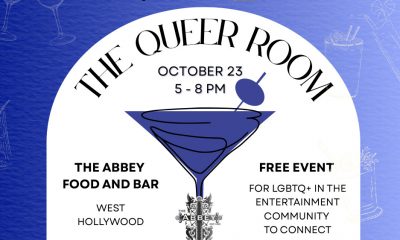
 Bars & Parties2 days ago
Bars & Parties2 days agoLos Angeles partners with Hyperion LA and LatiNation to present a free, entertainment industry mixer for the queer community
-
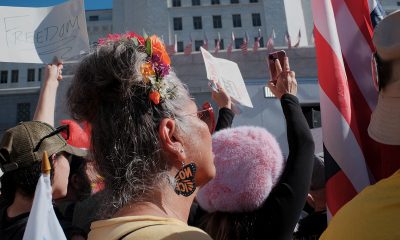
 Los Angeles2 days ago
Los Angeles2 days agoAnger, resistance and unity coursed through L.A. City Hall “No Kings” protest
-

 Bars & Parties5 days ago
Bars & Parties5 days agoLez Brunch will offer a safe haven for LGBTQ+ protestors on No Kings Day
-
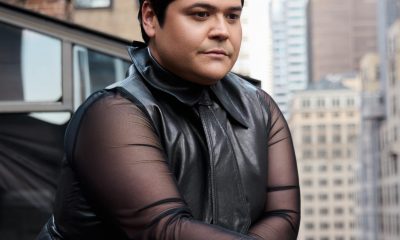
 a&e features20 hours ago
a&e features20 hours agoHarvey Guillén gets honest about ‘What We Do in the Shadows’ acting snub, fashion double standards and queer representation: “I’m just getting started”

